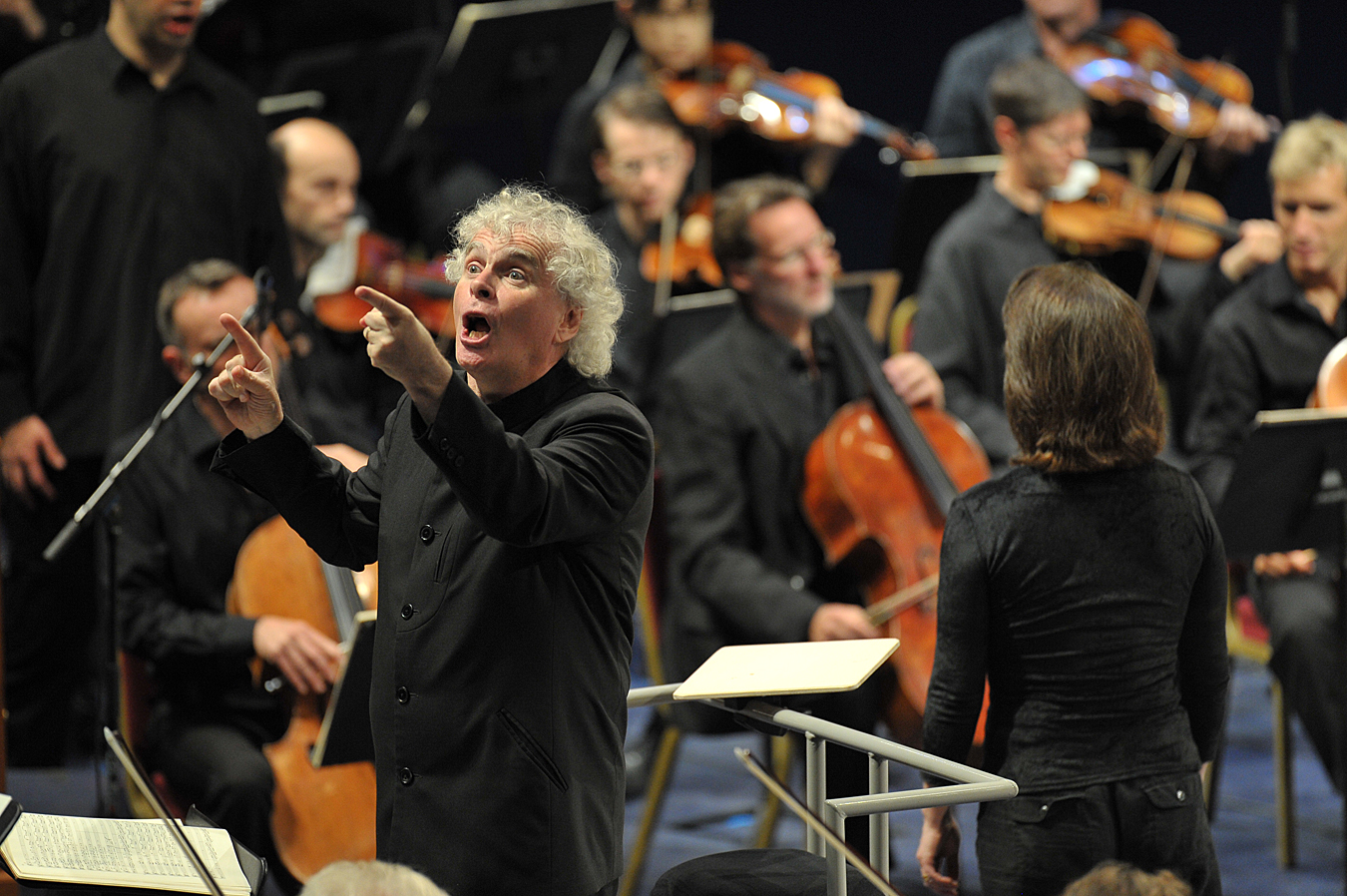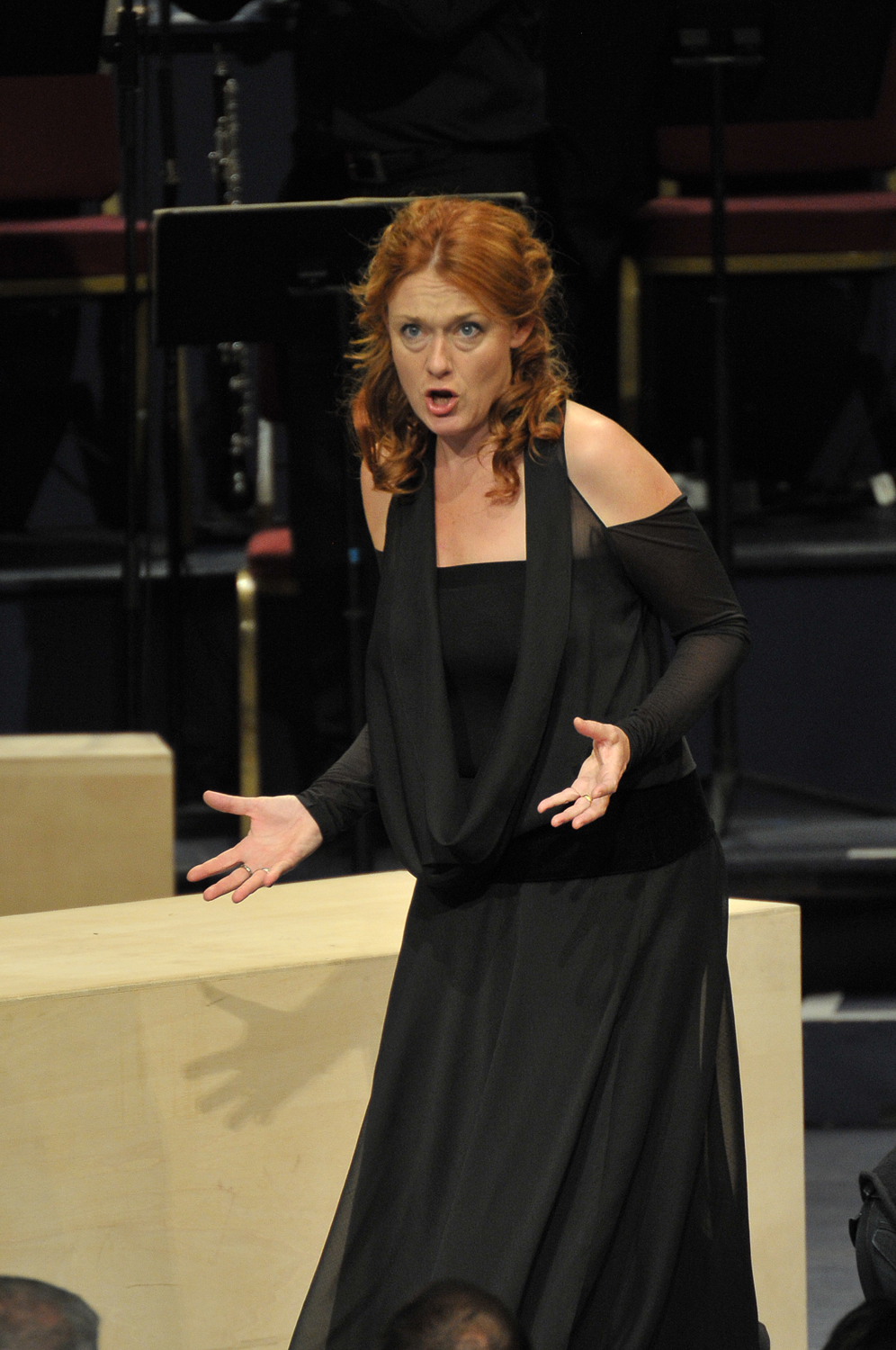Prom 66: St Matthew Passion, Berlin Philharmonic, Rattle | reviews, news & interviews
Prom 66: St Matthew Passion, Berlin Philharmonic, Rattle
Prom 66: St Matthew Passion, Berlin Philharmonic, Rattle
A deeply moving and daringly simple staging of Bach's great Passion
Peter Sellars’ work used to be about making a statement. He would dislocate texts from contexts, subvert musical suggestion and ignore written statement for the sheer joy of the artistic friction it would generate. The beauty of his St Matthew Passion staging however, first seen in 2010, is that it does nothing of the sort.
By the end of three hours of delicate, interpersonal drama and choric tableaux, Sellars has made no statement at all, and that refusal, that restraint, allows Bach’s music to speak louder than any amount of “konzept”. Of course Sellars is not alone in this. Jonathan Miller’s St Matthew staging is equally, if not more, simple, but there’s a ritual stature to Sellars’ that Miller pulls back from, scared somehow to commit himself to any large-scale gestures.
Rattle’s reading emerged from the emotions of the music, apparently unmediated by any stylistic affinity or agenda
The Royal Albert Hall is a space that can swallow even the largest gestures whole, and Sellars himself reconceived the production for this Proms performance. He also reassembled almost all his original cast, with the exception of the now-retired Thomas Quasthoff, replaced here by bass Eric Owens. Singing without scores, as did both the Berlin Radio Choir and the young choristers of Wells and Winchester Cathedrals, the soloists were free not only to narrate the musical drama, but to enact it in a series of physical movements and encounters.

If the quality of the orchestral playing and chorus singing wasn’t quite matched among the soloists, then it had surprisingly little impact on the intensity of the performance. Some alchemy between Sellars’ movement, Rattle’s music, Mark Padmore’s astonishing, raw Evangelist and the space of the Royal Albert Hall held us all in a state of emotional reciprocity, transforming a rag-bag of parts into a transcendent whole.

Christian Gerhaher, underused as Christus, never quite found his vocal stride (though an off day for the German baritone still proved finer than other people’s best), while bass soloist Eric Owens held tantalisingly back, offering delicious hints but never fully showing his vocal hand.
On paper this wasn’t an exceptional performance. In the hall (and on Radio 3) though, it was transmuted. Call it an aesthetic ritual or a spiritual one, a collective act of artistic engagement or an act or worship – something came together in the moment here to make this Passion so much more than the sum of its parts. Whether the alchemist was Rattle, Sellars or Bach himself is hard to say, and that in itself might just be the secret.
- Hear Peter Sellars discuss his staging on Radio 3
- Listen to this concert for the next month on BBC Radio iPlayer
rating
Share this article
Add comment
The future of Arts Journalism
You can stop theartsdesk.com closing!
We urgently need financing to survive. Our fundraising drive has thus far raised £49,000 but we need to reach £100,000 or we will be forced to close. Please contribute here: https://gofund.me/c3f6033d
And if you can forward this information to anyone who might assist, we’d be grateful.

Subscribe to theartsdesk.com
Thank you for continuing to read our work on theartsdesk.com. For unlimited access to every article in its entirety, including our archive of more than 15,000 pieces, we're asking for £5 per month or £40 per year. We feel it's a very good deal, and hope you do too.
To take a subscription now simply click here.
And if you're looking for that extra gift for a friend or family member, why not treat them to a theartsdesk.com gift subscription?
more Classical music
 Solomon, OAE, Butt, QEH review - daft Biblical whitewashing with great choruses
Even a top soprano and mezzo can’t make this Handel paean wholly convincing
Solomon, OAE, Butt, QEH review - daft Biblical whitewashing with great choruses
Even a top soprano and mezzo can’t make this Handel paean wholly convincing
 Two-Piano Gala, Kings Place review - shining constellations
London Piano Festival curators and illustrious friends entertain and enlighten
Two-Piano Gala, Kings Place review - shining constellations
London Piano Festival curators and illustrious friends entertain and enlighten
 Echo Vocal Ensemble, Latto, Union Chapel review - eclectic choral programme garlanded with dance
Beautiful singing at the heart of an imaginative and stylistically varied concert
Echo Vocal Ensemble, Latto, Union Chapel review - eclectic choral programme garlanded with dance
Beautiful singing at the heart of an imaginative and stylistically varied concert
 Scott, Irish Baroque Orchestra, Whelan, RIAM, Dublin review - towards a Mozart masterpiece
Characteristic joy and enlightenment from this team, but a valveless horn brings problems
Scott, Irish Baroque Orchestra, Whelan, RIAM, Dublin review - towards a Mozart masterpiece
Characteristic joy and enlightenment from this team, but a valveless horn brings problems
 Classical CDs: Voice flutes, flugelhorns and froth
Baroque sonatas, English orchestral music and an emotionally-charged vocal recital
Classical CDs: Voice flutes, flugelhorns and froth
Baroque sonatas, English orchestral music and an emotionally-charged vocal recital
 Kanneh-Mason, Britten Sinfonia, Shave, Milton Court - a grin and a big beaming smile
A pair of striking contemporary pieces alongside two old favourites
Kanneh-Mason, Britten Sinfonia, Shave, Milton Court - a grin and a big beaming smile
A pair of striking contemporary pieces alongside two old favourites
 theartsdesk at the New Ross Piano Festival - Finghin Collins’ musical rainbow
From revelatory Bach played with astounding maturity by a 22 year old to four-hand jazz
theartsdesk at the New Ross Piano Festival - Finghin Collins’ musical rainbow
From revelatory Bach played with astounding maturity by a 22 year old to four-hand jazz
 First Person: Manchester Camerata's Head of Artistic Planning Clara Marshall Cawley on questioning the status quo
Five days of free events with all sorts of audiences around Manchester starts tomorrow
First Person: Manchester Camerata's Head of Artistic Planning Clara Marshall Cawley on questioning the status quo
Five days of free events with all sorts of audiences around Manchester starts tomorrow
 Goldscheider, Brother Tree Sound, Kings Place review - music of hope from a young composer
Unusual combination of horn, strings and electronics makes for some intriguing listening
Goldscheider, Brother Tree Sound, Kings Place review - music of hope from a young composer
Unusual combination of horn, strings and electronics makes for some intriguing listening
 theartsdesk Q&A: composer Donghoon Shin on his new concerto for pianist Seong-Jin Cho
Classical music makes its debut at London's K-Music Festival
theartsdesk Q&A: composer Donghoon Shin on his new concerto for pianist Seong-Jin Cho
Classical music makes its debut at London's K-Music Festival

Comments
What nonsense! This staging
I have to agree with the
There will always be
Yes a completely amazing
The music was beautiful as
I agree with Anonymous (Sun,